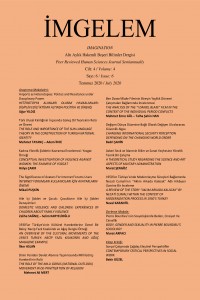Abstract
The private/public space dichotomy still holds a significant place in the Western political thought tradition. Hannah Arendt’s idealization of the distinction of the private and public realms in the Ancient Greek polis is no doubt one which essentializes the location with a strict division providing the possibility of the politics and resistance. However, there are certain spaces such as airports moving beyond the classical distinction. Then this paper modifies Arendt’s strict distinction of private/public by focusing on airports as heterotopias. The article admits international airports as heterotopic spaces by following Foucault’s heterotopia and his insight of modern power under the discussion of disciplinary society. This Foucauldian modification of space is presented with the Scene I within the framework of disciplinary power. Even though the Foucauldian insight of power illustrates how it functions by producing and shaping subjects through the assemblage of strategies and techniques, it is limited in terms of the emergence of resistance and politics. By reading the Scene II from Bakhtin’s carnival notion, the article with the argues that there are other spaces beyond private and public spaces in which politics as well as resistance can occur spaces beyond public by benefiting Jacques Rancière’s notion of politics as the disruption of the order.
References
- Arendt, H. (1958). The Human Condition. Chicago: University of Chicago Press.
- Bakhtin, M. (1984). Rabelais and His World. Bloomington: Indiana University Press.
- Barbour, C. & Zolkos, M. (2011). Action and Appearance: An Introduction. In A. Yeatman, P. Hansen, M. Zolkos & C. Barbour (Eds), Action and Appearance: Ethics and the Politics of Writing in Hannah Arendt (pp. 1-9). New York: Continuum Books.
- Bataille, G. (1962). Death and Sensuality: A Study of Eroticism and the Taboo. New York: Walker and Company.
- Benhabib, S. (1992). Models of Public Space: Hannah Arendt, the Liberal Tradition, and Jurgen Habermas. In C. Calhoun. (ed), Habermas and the Public Sphere (pp. 73-98). Cambridge: MIT Press.
- Bigo, D. (2008). Globalized (in)security: The Field and the Ban-opticon. In D. Bigo and A. Tsoukala (Eds.), Terror, Insecurity and Liberty: Illiberal Practices of Liberal Regimes After 9/11 (pp. 10-48). London: Routledge.
- Birmingham, P. (2011). On Action: The Appearance of the Law. In A. Yeatman, P. Hansen, M. Zolkos & C. Barbour (Eds), Action and Appearance: Ethics and the Politics of Writing in Hannah Arendt (pp. 103-115). New York: Continuum Books.
- Boston, W. 10/04/2012. “‘Pirates’ Deal a Blow to Germany's Political Status Quo.” The Wall Street Journal. https://www.wsj.com/articles/SB10001424052702304587704577333922727849932
- Calhoun, C. (1992). Introduction: Habermas and the Public Space. In C. Calhoun. (ed), Habermas and the Public Sphere (pp. 1-50). Cambridge: MIT Press.
- Daily Mirror 17/01/2010. German protesters strip-off in demonstration against full-body airport scanners. https://www.dailymail.co.uk/travel/article-1243439/Naked-Germans-protest-body-airport-scanners.html
- Debarbieux, B. (2017). Hannah Arendt’s Spatial Thinking: An Introduction. Territory, Politics, Governance, 5(4), 351-367. DOI: 10.1080/21622671.2016.1234407.
- Foucault, M. (1986). Of Other Spaces. Translated by J. Miskowiec. Diacritics, 16(1), 22-27.
- Foucault, M. (1991). Governmentality. In G. Burchell, C. Gordon., & P. Miller (eds). The Foucault Effect: Studies in Governmentality (pp. 87-104). Boston: Harvester Wheatsheaf.
- Fraser, N. (1981). Foucault on Modern Power: Empirical Insights and Normative Confusions. Praxis, 3, 272-287. Gordon, N. (2002). On Visibility and Power: An Arendtian Corrective of Foucault. Human Studies, 25, 125-145.
- Graham, A. (2008). Managing Airports: An International Perspective. Oxford: Elsevier.
- Haunss, S. (2013). Conflicts in the Knowledge Society: The Contentious Politics of Intellectual Property. New York: Cambridge University Press.
- Holquist, M. (2002). Dialogism: Bakhtin and His World. London: Routledge.
- Huffpost 3/05/2012. Oregon Man Strips Down To Protest TSA At Portland International Airport, https://www.huffpost.com/entry/naked-man-protests-tsa-at-portland-airport_n_1433830
- Jon Heller, K. (1996). Power, Subjectification and Resistance in Foucault. SubStance, 25(1), 78-110.
- Lisle, D. (2003). Site Specific: Medi(t)ations at the Airport. In F. Debrix and C. Weber (eds), Rituals of Meditation: International Politics and Social Meaning (pp. 3-29). Minneapolis: University of Minnesota Press.
- Martin, L. (2010). Bombs, bodies, and biopolitics: Securitizing the subject at the airport security checkpoint. Social & Cultural Geography, 11(1), 17-34. https://doi.org/10.1080/14649360903414585
- May, T. (2008). The Political Thought of Jacques Rancière: Creating Equality. Edinburg: Edinburg University Press. Mitchell, D. (1995). The End of Public Space? People’s Park, Definitions of the Public, and Democracy. Annals of Association of American Geographers 85(1), 108-133.
- Picket, B. L. (1996). Foucault and the Politics of Resistance. Polity, 28(4), 445-466. Pitkin, H. F. (2000). The Attack of the Blob: Hannah Arendt’s Concept of Social. Chicago: The University of Chicago Press.
- Rancière, J. (1999). Disagreement: Politics and Philosophy. Minneapolis: University of Minnesota Press.
- Rancière, J. (2001). Ten Theses on Politics. Theory and Event 5(3).
- Rancière, J. (2004). The Politics of Aesthetics: The Distribution of the Sensible. London: Continuum.
- Salter, M. (2007). Governmentalities of an Airport: Heterotopia and Confession. International Political Sociology 1(1), 49-66. https://doi.org/10.1111/j.1749-5687.2007.00004.x
- Stallybrass, P. & White, A. (1986). The Politics and Poetics of Transgression. New York: Cornell University Press. Sennett, R. (2002). The Fall of Public Man. London: Penguin Books.
- Weintraub, J. (1997). The Theory and Politics of the Public/Private Distinction. J. Weintraub & K. Kumar (eds.), Public and Private in Thought and Practice (pp. 1-42). Chicago: The University of Chicago Press.
Abstract
The private/public space dichotomy still holds a significant place in the Western political thought tradition. Hannah Arendt’s idealization of the distinction of the private and public realms in the Ancient Greek polis is no doubt one which essentializes the location with a strict division providing the possibility of the politics and resistance. However, there are certain spaces such as airports moving beyond the classical distinction. Then this paper modifies Arendt’s strict distinction of private/public by focusing on airports as heterotopias. The article admits international airports as heterotopic spaces by following Foucault’s heterotopia and his insight of modern power under the discussion of disciplinary society. This Foucauldian modification of space is presented with the Scene I within the framework of disciplinary power. Even though the Foucauldian insight of power illustrates how it functions by producing and shaping subjects through the assemblage of strategies and techniques, it is limited in terms of the emergence of resistance and politics. By reading the Scene II from Bakhtin’s carnival notion, the article with the argues that there are other spaces beyond private and public spaces in which politics as well as resistance can occur spaces beyond public by benefiting Jacques Rancière’s notion of politics as the disruption of the order.
References
- Arendt, H. (1958). The Human Condition. Chicago: University of Chicago Press.
- Bakhtin, M. (1984). Rabelais and His World. Bloomington: Indiana University Press.
- Barbour, C. & Zolkos, M. (2011). Action and Appearance: An Introduction. In A. Yeatman, P. Hansen, M. Zolkos & C. Barbour (Eds), Action and Appearance: Ethics and the Politics of Writing in Hannah Arendt (pp. 1-9). New York: Continuum Books.
- Bataille, G. (1962). Death and Sensuality: A Study of Eroticism and the Taboo. New York: Walker and Company.
- Benhabib, S. (1992). Models of Public Space: Hannah Arendt, the Liberal Tradition, and Jurgen Habermas. In C. Calhoun. (ed), Habermas and the Public Sphere (pp. 73-98). Cambridge: MIT Press.
- Bigo, D. (2008). Globalized (in)security: The Field and the Ban-opticon. In D. Bigo and A. Tsoukala (Eds.), Terror, Insecurity and Liberty: Illiberal Practices of Liberal Regimes After 9/11 (pp. 10-48). London: Routledge.
- Birmingham, P. (2011). On Action: The Appearance of the Law. In A. Yeatman, P. Hansen, M. Zolkos & C. Barbour (Eds), Action and Appearance: Ethics and the Politics of Writing in Hannah Arendt (pp. 103-115). New York: Continuum Books.
- Boston, W. 10/04/2012. “‘Pirates’ Deal a Blow to Germany's Political Status Quo.” The Wall Street Journal. https://www.wsj.com/articles/SB10001424052702304587704577333922727849932
- Calhoun, C. (1992). Introduction: Habermas and the Public Space. In C. Calhoun. (ed), Habermas and the Public Sphere (pp. 1-50). Cambridge: MIT Press.
- Daily Mirror 17/01/2010. German protesters strip-off in demonstration against full-body airport scanners. https://www.dailymail.co.uk/travel/article-1243439/Naked-Germans-protest-body-airport-scanners.html
- Debarbieux, B. (2017). Hannah Arendt’s Spatial Thinking: An Introduction. Territory, Politics, Governance, 5(4), 351-367. DOI: 10.1080/21622671.2016.1234407.
- Foucault, M. (1986). Of Other Spaces. Translated by J. Miskowiec. Diacritics, 16(1), 22-27.
- Foucault, M. (1991). Governmentality. In G. Burchell, C. Gordon., & P. Miller (eds). The Foucault Effect: Studies in Governmentality (pp. 87-104). Boston: Harvester Wheatsheaf.
- Fraser, N. (1981). Foucault on Modern Power: Empirical Insights and Normative Confusions. Praxis, 3, 272-287. Gordon, N. (2002). On Visibility and Power: An Arendtian Corrective of Foucault. Human Studies, 25, 125-145.
- Graham, A. (2008). Managing Airports: An International Perspective. Oxford: Elsevier.
- Haunss, S. (2013). Conflicts in the Knowledge Society: The Contentious Politics of Intellectual Property. New York: Cambridge University Press.
- Holquist, M. (2002). Dialogism: Bakhtin and His World. London: Routledge.
- Huffpost 3/05/2012. Oregon Man Strips Down To Protest TSA At Portland International Airport, https://www.huffpost.com/entry/naked-man-protests-tsa-at-portland-airport_n_1433830
- Jon Heller, K. (1996). Power, Subjectification and Resistance in Foucault. SubStance, 25(1), 78-110.
- Lisle, D. (2003). Site Specific: Medi(t)ations at the Airport. In F. Debrix and C. Weber (eds), Rituals of Meditation: International Politics and Social Meaning (pp. 3-29). Minneapolis: University of Minnesota Press.
- Martin, L. (2010). Bombs, bodies, and biopolitics: Securitizing the subject at the airport security checkpoint. Social & Cultural Geography, 11(1), 17-34. https://doi.org/10.1080/14649360903414585
- May, T. (2008). The Political Thought of Jacques Rancière: Creating Equality. Edinburg: Edinburg University Press. Mitchell, D. (1995). The End of Public Space? People’s Park, Definitions of the Public, and Democracy. Annals of Association of American Geographers 85(1), 108-133.
- Picket, B. L. (1996). Foucault and the Politics of Resistance. Polity, 28(4), 445-466. Pitkin, H. F. (2000). The Attack of the Blob: Hannah Arendt’s Concept of Social. Chicago: The University of Chicago Press.
- Rancière, J. (1999). Disagreement: Politics and Philosophy. Minneapolis: University of Minnesota Press.
- Rancière, J. (2001). Ten Theses on Politics. Theory and Event 5(3).
- Rancière, J. (2004). The Politics of Aesthetics: The Distribution of the Sensible. London: Continuum.
- Salter, M. (2007). Governmentalities of an Airport: Heterotopia and Confession. International Political Sociology 1(1), 49-66. https://doi.org/10.1111/j.1749-5687.2007.00004.x
- Stallybrass, P. & White, A. (1986). The Politics and Poetics of Transgression. New York: Cornell University Press. Sennett, R. (2002). The Fall of Public Man. London: Penguin Books.
- Weintraub, J. (1997). The Theory and Politics of the Public/Private Distinction. J. Weintraub & K. Kumar (eds.), Public and Private in Thought and Practice (pp. 1-42). Chicago: The University of Chicago Press.
Details
| Primary Language | English |
|---|---|
| Subjects | Political Science |
| Journal Section | Articles |
| Authors | |
| Publication Date | July 11, 2020 |
| Submission Date | May 7, 2020 |
| Acceptance Date | June 12, 2020 |
| Published in Issue | Year 2020 Volume: 4 Issue: 6 |

This work licensed under a Creative Commons Attribution-NonCommercial 4.0 International License.
Please click here to contact the publisher.


